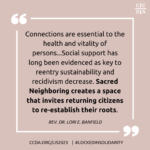On October 13th, after six days of navigating bomb shelters in Jerusalem, I arrived at Logan International Airport. As I shuffled toward customs I watched the sunrise over Boston. I resented its beauty because it increased the weight of privilege: I was relieved to be out of a war zone and ashamed for having left.
That burden consumed me as I mindlessly answered the questions of a customs officer. His final inquiry, though, jarred me back into the present.
“What’s the nature of your work?”
“Peacemaking.” was all I could muster.
Bewildered, he slid my passport through the glass and asked, “Then why did you leave?”
I walked away without answering, not because I didn’t want to, but because I didn’t have one. At that moment, I couldn’t conceive of how any work done over here could bring an end to the violence that was imminent then – the human catastrophe that is being realized now – over there.
Further unsettled, I reached out to my constellation of mentors. One invitation, in particular, has shaped my love, informed my leadership, and fueled the work of Global Immersion since. It was offered by a trusted confidant who is a Jewish American Rabbi.
“Your people have lost their way. They grasp for power rather than for the hands of another. Help them relocate their revolutionary contribution. We need you to be distinctively, unapologetically, and generously Christian not in the way of the West, but in the way of Jesus.”
The term “revolutionary contribution” was new language from him, so I asked for clarification.
He responded by quoting my sacred text: “Love God by sacrificially loving neighbor and enemy. This is your revolutionary contribution.”
He had woven together two mission-defining teachings of Jesus to remind me of the distinctiveness of the movement I’m a part of. In the first passage, Matthew 5:43-48, Jesus moved us beyond neighbor-love to enemy-love. In the second passage, John 13:34-35, Jesus centered his example of sacrifice as the technique of that love.
The Rabbi then encouraged me to return to my sacred text. He asked me to locate where Jesus confronted any theology or ideology that limited love and diminished the belovedness of another. He urged me to observe Jesus’ approach to companioning his community in their transformation and to do likewise. In this process, he was certain that I would find my answer to the customs officer’s question.
Motivated both by his critique and counsel, I turned to the controversial encounter found in Matthew 15:21-28. Previous to this passage, Jesus was in conversation with entrenched religious folk who critiqued what appeared to be Jesus’ disregard for religious rules. With kindness and conviction, Jesus urged them beyond the violence of certainty to the transformation of compassion. The rigidity of their theology had generated within them an ideology of power and a preference for human hierarchies that were costly for everyone.
Jesus and his community then “withdrew” to a region known as Tyre and Sidon. Rather than this being a movement toward a tranquil retreat space, it was an invitation to cross boundaries into what they would have considered a contaminated neighborhood. Matthew then describes an encounter with a “Canaanite” woman. By design, this designation signaled that Jesus and his community were in enemy territory and proximate to someone deemed violent, even subhuman.
But from her perspective, she likely understood herself as an indigenous mother who was in pain. Based on the historical relationship between Canaanites and Israelites, she may have viewed Jesus and his community as her occupier and oppressor. Conscious of the constructed stereotypes and dehumanizing treatment of her people by Jesus’ people, she approached them with clarity and with volume.
She begged for mercy on behalf of her suffering daughter, and she did so very loudly.
For Jesus and his community, a spiritual truth had collided with a social lie. The spiritual truth was that God is pro-human; there are no human hierarchies; and she is beloved. The social lie is that God is partial; there are human hierarchies; and she exists beyond the reach of God’s love and, therefore, their concern.
Observing the collision, Jesus’s initial response was silence. Yet his community responded with disdain.
Provoked by their presence on contaminated soil and irritated by her intrusion, they gave voice to their theology and ideology by imploring Jesus to get rid of her. They viewed her as an inferior, compromising, inconvenience that deserved whatever torment she was enduring. Their comfort was more important than her pain.
At last, Jesus spoke, but not directly to the indigenous mother or his community. Matthew offers a glimpse into the interior monologue of a troubled Rabbi. His understanding of his mission was being expanded by the beloved image bearer in front of him who was in pain and who was clearer about who he was than were his people.
She sensed that Jesus didn’t think as poorly of her as they did so she drew closer and repeated her request for mercy.
Then, in Matthew 15:26, Jesus spoke again, not to the mother, but indirectly to his community. His words seem to refer to the woman as a dog unworthy to eat the scraps from their table, making Jesus sound more like a red-necked bigot than the Prince of Peace. However, rather than calling her a racial epithet, Jesus had surfaced a dehumanizing Jewish slogan to expose the illegitimacy of his community’s theology and ideology. He confronted their constructed worldview that sought to diminish her intrinsic value and dignity and that inaccurately declared her beyond the reach of God’s love.
The indigenous mother took it in stride. She refused to allow the broken theology and ideology of Jesus’ community to dissuade her. The slogan would have stung, but she was used to Jewish men referring to her and her people as dogs. Rather than walking away, she persisted, using Jesus’ words to turn the tables on them with a defiant declaration of equity: “Dogs or not, we’re all in the same house sharing the same meal.”
She had the last word…the teaching was hers.
As a result, Jesus spoke directly to her. He liberated her daughter and restored both mother and daughter to the community. Simultaneously, he accompanied his community in their journey of transformation from a theology that promoted a partial God, false binaries, and animated apathy to a spacious faith that declared everyone beloved and worthy of mercy and justice.
There it was…my answer to the customs officer’s question.
I left Israel because an end to the violence there requires the transformation of Christians here. The work of the organization I co-founded is to companion Western Christians in their journey from a religion that dominates to a faith that restores. The journey takes us beyond the margins of certainty, familiarity, and comfort and into transforming proximity where constructed enemies become co-creating allies. The urgent work involves allowing our theologies and ideologies to be interrogated for ways in which they limit love, diminish belovedness, and prematurely extinguish the lives of others. The goal is to become a people who, like Jesus, prioritize the pain of the marginalized rather than the comfort of the privileged.
This journey requires us to embrace our revolutionary contribution of loving God by sacrificially loving our neighbors, others, irritants, and enemies.
So, in this moment marked by dangerous divides and unthinkable violence, may God give us the courage to embody this distinct revolutionary contribution. May God grant us the will to stop grasping for power and start reaching for one another. May God offer us patience with ourselves and others along this perilous pilgrimage of transformation. May God awaken our creativity for embodied, costly solidarity that disarms, dismantles, transforms, and restores.
This article is an adaptation of the keynote address offered by Dr. Jer Swigart at the White House’s “Summit to Counter Antisemitism, Islamophobia, and Related Forms of Hatred and Bias in Rural America” hosted at the Tri-Faith Commons in Omaha, NE on May 15, 2024.
This article was co-published with our partners at Red Letter Christians.

About Dr. Jer Swigart
Dr. Jer Swigart is the co-founder of Global Immersion. He seeks to learn, love, and lead in ways that disarm violence, bridge difference, and awaken imaginations to restorative possibilities. He focuses on leadership formation, particularly with leaders and teams who have become disillusioned by the incongruence between the values of western Christianity and those of Jesus. In addition to his participation in local and national justice and reconciliation commissions, Jer is a North American contributing member of the Reconcilers Together Alliance, a Pepperdine Cross Sector Leadership Fellow, and a Senior Fellow of the Dietrich Bonhoeffer Institute. He holds an MDiv from Fuller Theological Seminary and his Doctor of Leadership in Global Perspectives from Portland Seminary. As the co-author of Mending the Divides: Creative Love in a Conflicted World, a speaker, facilitator, and consultant, he often reflects on the intersection of faith, leadership, and conflict transformation. Jer and his family live in the Pacific Northwest, USA.

